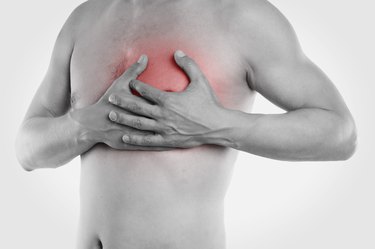
Chest pain in your upper-left chest during exercise and lying down can occur for various reasons including coronary artery disease and high blood pressure. Chest pain related to cardiac or heart-related functioning, results in symptoms such as tightness in your chest and crushing pain. Pain in your upper-left chest that occurs from non-heart-related causes can produce symptoms including heartburn. If you experience chest pain, consult your doctor immediately.
Heart-Related Causes
Video of the Day
Chest pain that occurs in any area of your chest, when you exercise or lie down, can result from several potentially dangerous heart conditions such as an acute heart attack, inflammation of the sac around your heart and inflammation of the heart itself. Cardiomyopathy, or heart failure, can also produce chest pain. Angina pectoris, the medical term for chest pain, and a coronary spasm can result in pain that occurs when you perform specific actions such as exercising and lying down.
Video of the Day
Angina and Coronary Spasm
Angina that occurs from the buildup of cholesterol-containing plaques in your coronary arteries -- known as coronary artery disease -- can produce chest pain during exercise; whereas, a coronary spasm can cause chest pain while you lie down or rest. Narrowed, clogged coronary arteries, which carry blood to your heart, can produce chest pain slightly to the left of your breast bone. Stable, or predictable angina, usually occurs with physical activity, often lasts one to 15 minutes and improves when exercise slows down or stops, according to Medline Plus. Unstable angina, however, produces unpredictable, progressive chest pain. A coronary spasm results when your coronary arteries spasm and temporarily reduce the blood supply to your heart. Coronary spasms often happen while lying down and may appear in conjunction with coronary artery disease.
Non-Cardiac-Related Causes
Chest pain can result from heartburn, high blood pressure and other non-cardiac related conditions. Heartburn, a burning sensation produced by stomach acid moving into your esophagus, often occurs after consuming a heavy meal or when lying down. Pain may begin in your lower abdomen, spread to your neck area and last from a few moments to a few hours, according to the Mayo Clinic. According to the cardiologist Howard H. Wayne, the most common cause of chest pain is high blood pressure -- which rises during periods of extreme activity or stress. Other possible causes of pain in your upper-left chest area include clots in your lungs, gallstones, chronic pain syndromes, such as fibromyalgia, injured ribs and pinched nerves.
Considerations
Pain in your upper-left chest that occurs during exercise or when lying down may indicate serious heart problems or other potentially dangerous conditions. According to MedlinePlus, you need to seek immediate medical attention if you experience sudden, crushing, squeezing and tightening pressure in your chest or pain that radiates to your jaw, left arm or shoulder blades. Chest pain accompanied by a shortness of breath, nausea, dizziness, sweating and a rapid heart beat also warrants immediate medical attention. In addition, consult your doctor if your chest pain intensifies, occurs after easy exertion or lasts longer than usual.